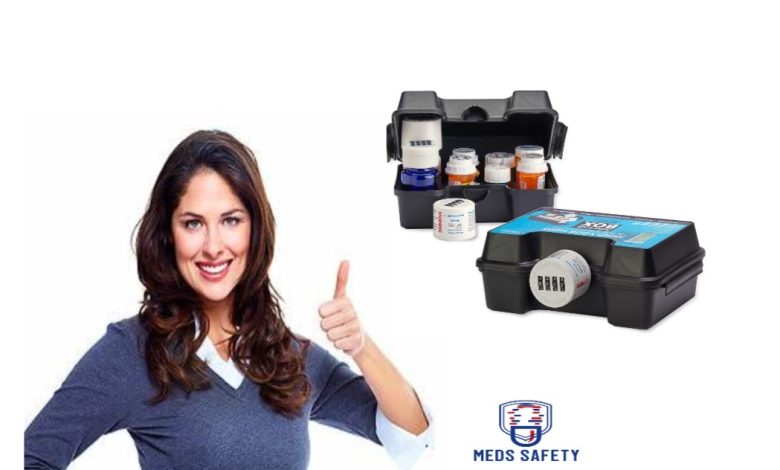Why You Should Get A Lockable Medicine Box (10 Benefits)

A lockable medicine box, also known as a medication lock box or a medicine safe, is a secure container designed to store medications and keep them out of reach of unauthorized individuals. It is commonly used to promote medication safety and prevent accidental ingestion or misuse, particularly in households with children, elderly individuals, or individuals with cognitive impairments.
Lockable medicine boxes come in various sizes, designs, and locking mechanisms, but they typically feature the following characteristics:
1. Secure Construction: They are made of durable materials such as metal or sturdy plastic to ensure the box cannot be easily tampered with or broken into.
2. Locking Mechanism: They incorporate a lock or combination lock to restrict access. Some models may have key locks, while others use numeric or alphanumeric combinations.
3. Portable and Compact: Medicine boxes are often designed to be portable and compact, allowing for easy storage and transportation. This is particularly useful for individuals who need to take their medications while away from home.
4. Internal Organization: Many medicine boxes have compartments or dividers inside to help organize different types of medications and reduce the risk of mixing them up.
5. Child-Resistant Features: Some lockable medicine boxes are designed with child-resistant features, such as combination locks that are difficult for young children to figure out or tamper-resistant construction.
Brands of Lockable Medicine Boxes
There are several reputable brands that offer lockable medicine boxes designed to safely store medications. Here are a few well-known brands in this category:
1. Medline: Medline is a leading healthcare company that produces a variety of medical supplies, including lockable medicine boxes. They offer durable and secure options with different sizes and locking mechanisms.
2. Vaultz: Vaultz specializes in secure storage solutions, including lockable medicine boxes. Their products feature combination locks, reinforced steel corners, and customizable internal organization.
3. Medicine Safe: Medicine Safe focuses specifically on lockable medicine boxes and offers various models to cater to different needs. Their boxes often feature tamper-proof construction, key or combination locks, and compartments for easy organization.
4. MedReady: MedReady produces lockable medication dispensers that can also serve as storage boxes. Their products are designed to provide controlled access to medications and often include features such as programmable timers and alarms.
5. LiveFine: LiveFine manufactures lockable medicine boxes with a focus on portability and organization. Their boxes often include multiple compartments, clear labeling, and secure locking mechanisms.
6. Metene: Metene offers lockable medicine boxes designed for both home and travel use. Their products feature compact designs, sturdy construction, and user-friendly locking mechanisms.
When considering a lockable medicine box, it’s important to assess your specific requirements, such as size, locking mechanism, and organization features, to choose a brand and model that best suits your needs. Reading customer reviews and comparing product specifications can also help you make an informed decision.
Benefits Of Locking Box For Medications
Locking boxes for medications offer several benefits, particularly in households or environments where there are individuals who need to ensure the safety and security of their medications. Here are some key advantages of using a locking box for medications:
1. Medication Safety: Locking boxes provide a secure storage solution, reducing the risk of accidental ingestion, medication mix-ups, or unauthorized access. This is especially important in households with young children or individuals who may be prone to confusion or cognitive impairments.
2. Prevents Misuse and Abuse: Locking boxes help prevent unauthorized access to medications, reducing the likelihood of medication misuse or abuse by individuals who may have a history of substance abuse or addictive behaviors.
3. Protection against Theft: Medications can be valuable and attractive targets for theft. A locking box adds an extra layer of security, deterring theft and safeguarding expensive or controlled substances.
4. Organization and Convenience: Locking boxes often feature compartments or dividers, allowing for organized storage of different medications. This makes it easier to locate specific medications when needed, especially for individuals who take multiple medications or have complex medication regimens.
5. Portability and Travel-Friendliness: Many locking boxes are designed to be portable, making it convenient to carry medications while traveling or away from home. They provide a safe and secure means to transport medications, ensuring they remain protected and accessible during trips.
6. Peace of Mind: Using a locking box for medications provides peace of mind for individuals who need to store their medications securely. It alleviates concerns about accidental ingestion, unauthorized access, or potential medication-related incidents.
7. Compliance with Regulations: Some medications, particularly controlled substances, require strict security measures to comply with legal and regulatory requirements. A locking box helps meet these requirements and ensures adherence to regulations regarding medication storage and security.
It is important to note that a locking box for medications is an additional precautionary measure and should not replace proper medication management practices, such as reading and following medication labels, consulting healthcare professionals, and adhering to prescribed dosage instructions.
How to Use a Lockable Medicine Box
Using a lockable medicine box is relatively straightforward. Here’s a step-by-step guide on how to use one effectively:
1. Choose the Right Box: Select a lockable medicine box that suits your needs in terms of size, features, and locking mechanism. Ensure it is made of sturdy materials and has compartments or dividers if desired.
2. Set a Secure Location: Find a secure and convenient location to place the medicine box. Consider factors such as accessibility for authorized individuals and keeping it out of reach of children or individuals who should not have access to the medications.
3. Gather Your Medications: Collect all the medications that need to be stored in the box. Make sure they are in their original containers with clearly visible labels. Sort and organize them as needed, placing similar medications together.
4. Open the Box: Depending on the locking mechanism, unlock the box using the provided key or input the correct combination. Some lockable medicine boxes may have instructions specific to their locking mechanism, so refer to the manufacturer’s guidelines if necessary.
5. Arrange the Medications: Place the medications inside the box, taking care to separate different types of medications to avoid confusion. Utilize any compartments or dividers within the box to keep the medications organized and easily identifiable.
6. Close and Lock the Box: Once all the medications are inside, securely close the box. Engage the lock or enter the combination, ensuring it is properly secured to prevent unauthorized access.
7. Store the Key or Combination Securely: If using a lockable box with a key, keep the key in a safe place that is known only to authorized individuals. If using a combination lock, memorize the combination or keep it in a secure location that is not easily accessible to others.
8. Accessing Medications: When you need to access the medications, unlock the box using the key or combination. Retrieve the necessary medications while keeping the box secure.
9. Re-Lock the Box: After accessing the medications, make sure to re-lock the box to maintain its security. Ensure the lock is properly engaged or the combination is reset as needed.
Remember to follow any additional instructions provided by the manufacturer for your specific lockable medicine box. Regularly review and update the contents of the box, removing expired or unused medications. Also, ensure that you continue to follow proper medication management practices and consult healthcare professionals when necessary, even when using a lockable medicine box.





